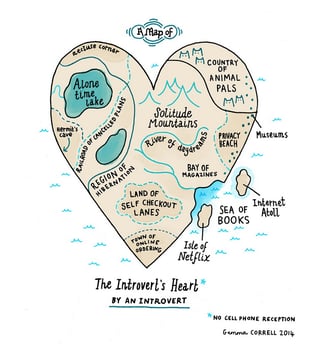 Depending on which study you consult, 33 to 50 percent of Americans are introverted—in other words, at least one third to one half of the people we know. That stat directly translates to the workplace, where the unique needs and special talents of introverts should be embraced. Accommodating those who draw more energy from alone time than from time spent with others is simple through adaptable business processes, team building and resources.
Depending on which study you consult, 33 to 50 percent of Americans are introverted—in other words, at least one third to one half of the people we know. That stat directly translates to the workplace, where the unique needs and special talents of introverts should be embraced. Accommodating those who draw more energy from alone time than from time spent with others is simple through adaptable business processes, team building and resources.
Susan Cain’s TED talk, “The Power of Introverts,” brought the house down with a standing ovation. In her talk, Cain gives powerful examples of living as an introvert in a world that rewards being social. As an introvert, Cain bowed to pressure to become more outgoing in both her lifestyle and profession. On the TED stage, she talks about the unique abilities of people who scale more introverted and the cost that employers, family members and relationships pay when we either expect, or when our business policies and processes require, introverted people to adhere to extroverted ideals.
The Power of Introverts
As this a great article about the traits of introverts in the workplace shows, introverted team members thrive when they are able to perform a task without disruption due to their keen focus. They make great leaders (and salespeople) because of their listening skills. Introverted people are also motivated to complete jobs to a high standard. They bring a creative eye to problem solving and can be extremely productive when working in an environment that is well-suited for an introvert.
As you may have noticed, your introverted colleagues typically prefer listening instead of speaking and working on their own over working in teams. With a few modest changes in the workplace, introverted coworkers can flourish in a team environment that helps everyone enjoy the way they work. Here are some suggestions that work well for us at Trumpet.
Brainwriting Instead of Brainstorming
Increasingly, when we solicit ideas from our teams, we are using a technique called brainwriting rather than brainstorming. Research shows brainwriting gives you a greater number of ideas and more original ideas than brainstorming. The idea of brainwriting is, once you frame the issue or problem your team needs to address, you give people time to privately jot down their ideas on their own instead of soliciting ideas to be called out in a group setting. Only once the brainwriting portion has come to an end is when you do the idea sharing and vetting.
It’s such a simple change to make. So, what’s the big deal? Introverted people are known to be deep thinkers. Without the pressure of having to generate ideas in a call-out type of group setting, introverts are free to develop ideas on their own first. In traditional brainstorming sessions, sometimes more extroverted team members can dominate the session, either leaving original ideas unformed for an introvert ("There’s too much conversation for me to give the question the deep thought it deserves") or unspoken ("There are plenty of ideas already on the table, so I don’t need to add more, particularly if mine might be really different than everything that’s already been shared"). Additionally, all the commotion of calling out ideas can leave an introvert “jammed up"; in other words, too flooded by all the discussion to really think about the issue.
Writing as a way of Discussing
It can be challenging from both a time and energy standpoint to be in a lot of meetings each week. Many years ago, as an alternative to meetings, yet while still encouraging ongoing communication, we introduced the concept of internal web forums to our teams. Simply put, the forums are a way for our teams to work out problems we want to solve, float a new idea, or share a mistake and what we learned from it.
Internal forums are grouped by subject matter. For example, our Client Service Team has their own dedicated web forum. There, they routinely post things like Project Debriefs, which are summaries of each client project, along with lessons learned, as well as results of Client Feedback Calls, among other things.
The bottom line is, “discussing” on internal web forums makes it easier for many introverted team members to share information rather than engage in frequent conversations that might otherwise not occur. In addition, it memorializes decisions that are made by the team that they can refer back to. I can’t tell you how many times someone might say, “Why did we decide to do X again?” They can refer back to a forum where a decision was made, along with all the details.
Pay Attention to the Daily Schedule
One thing we know about introverted coworkers is that being with people depletes their energy, and working on their own energizes them. Think about a typical day-in-the-life at your firm. How may company and client meetings might a typical employee (who is more introverted) need to attend each day?
Before you book in that lunch meeting on top of their already booked calendar, rethink context. What will produce the best outcome for a meeting or conversation I wish to have with my introverted team member given the results I say I want? That leads to the next point. When working with introverted team members, provide the ability to plan.
Provide the Ability to Think Deeply and in Advance
Walking into a meeting expecting participation on demand (like brainstorming, for example), doesn’t set up a introverted team member for success. Because introverted people are best when they can synthesize information before forming creative solutions, instead of just providing a meeting agenda, send them key points to consider in advance of a meeting to enable an introvert to give the issue concerted thought.
Note this requires they have time in their calendar to “prep” for the meeting. Remember, introverted coworkers are deep thinkers, and creating time for them to think about the problem or issue in advance of talking about it is a huge advantage to not only them but you, who wants the benefit of their input.
 Begin Meetings with Positive Focus and Why
Begin Meetings with Positive Focus and Why
A few years back, we started to begin every staff meeting at Trumpet with “positive focus.” Simply put, positive focus is now a 15-second share from each attendee at the start of the meeting about something they are feeling positive about—it could be personal or work-related. One team member may share that they just hosted a successful educational webinar on report automation, whereas another may share that her son placed second at a Tae Kwon Do competition.
Besides getting everyone in a positive mood to have a great meeting, we’ve found positive focus makes it even easier for introverts to connect to peers. Whereas before it may have been more challenging for more introverted team members to strike up a conversation with a teammate, now they have all kinds of relational information from which they can draw on to strengthen their relationships with their teammates.
Lunch Lottery
Another way introverted team members get to learn more about other teammates and share more about themselves while learning about others is through Trumpet’s “lunch lottery.” Every few weeks, Trumpet randomly selects four team members to go to lunch together, with a list of four or five conversation starters to discuss. Examples include, “If you were stranded on a desert island, what three books would you bring with you?”, or “What’s something you love to do and haven’t done in awhile because you are too busy?”
Lunch-goers receive the list of questions in advance to ponder. Everyone reports back how fun these lunches are and how much they learn about their teammates that they wouldn’t have otherwise known.
A Peaceful Retreat: Quiet Zones
In our new office, we created a quiet zone. Simply put, it’s a relaxation room with couches, easy chair, curtains— a place where anyone can go to recharge during the day. A quiet zone can become a safe haven when you’ve been overstimulated by your workday and just need a few minutes to gather some energy or quiet your mind.
In addition, we have a few private offices anyone can grab for a quick meeting or a phone call, away from the noise of the office. Introverted team members have expressed real appreciation for these resources and definitely use them.
Encourage Self-Awareness and Self-Care
Helping our team members take better care of themselves means they're more productive at work. One of our introverted team members shared that Mother’s Day is always a very busy day in his family each year, as he spends time with both his and his wife’s families. At the end of that Sunday, he is pretty wiped out. What day do you think would be a super day for him to take off each year, just for himself, to re-energize? Imagine the difference he feels coming into work on a Monday following an exhausting day of constant social interaction, versus Tuesday, after a day of down time and self-care?
Other introverted team members who spend a lot of time on the phone build scheduled time most days on their calendars for “special projects” to give them a break from being engaged in conversation most of their day. Encouraging introverted team members to take care of themselves by the way they plan their day and being responsive to how much interaction depletes them is one way to help them enjoy the way they work.
Bottom line, due to their ability for deep thought, fantastic listening skills, and keen focus, more introverted team members can be amazing contributors and appreciative teammates when set up for success.
Are you more introverted? If so, please help other readers by sharing some of your strategies for how you approach your work day.




